Hillary Clinton spoke with federal investigators Saturday about her use of a private email server while secretary of State.
- Clinton’s campaign says she was interviewed at FBI headquarters
- Trump is criticized over tweet featuring Jewish images and stereotypes
- Catch up with these #longreads over the holiday weekend about:
- How Donald Trump handles competition: Go inside his secret smear campaign against an Indian casino
- How Tim Kaine went from “wild card” vice presidential pick to shortlist favorite
- The time House Democrats mistakenly released a transcript confirming a big payout for a Clinton pal
- Share via
Tom Cotton says he’s not being vetted to be Donald Trump’s running mate
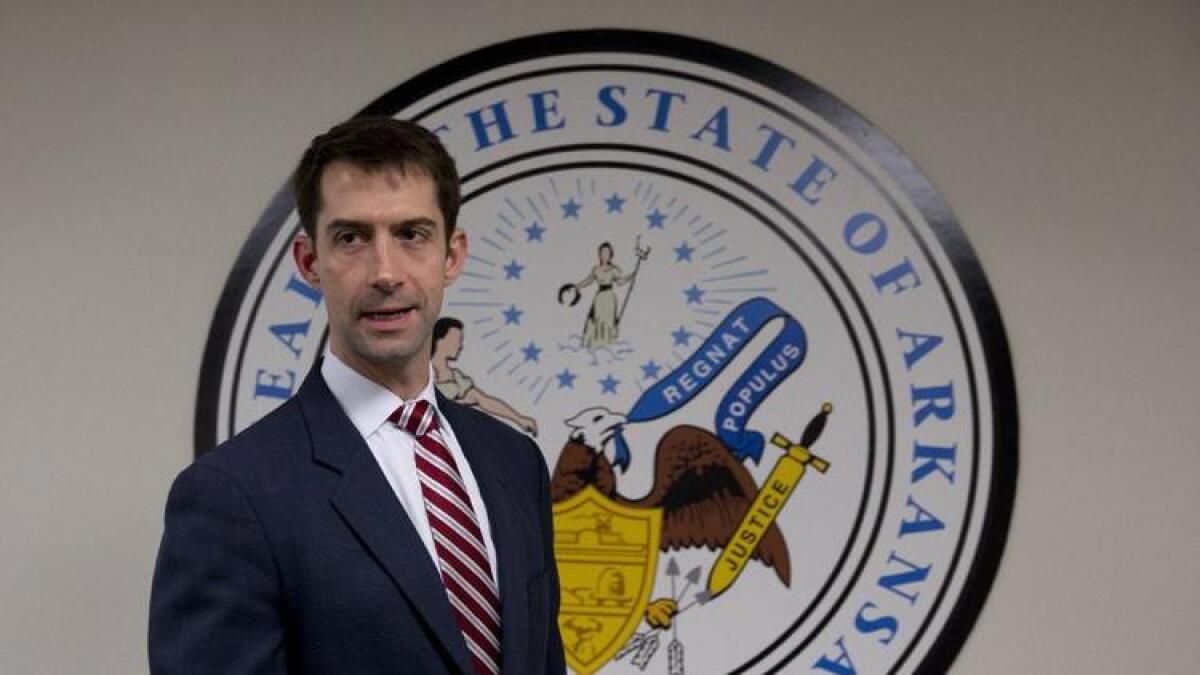
Arkansas Sen. Tom Cotton, a Republican up-and-comer whose name has frequently been bandied about as a potential running mate for Donald Trump, played down his prospects to be on the GOP presidential ticket on Saturday.
“I’m not being vetted. And I have no reason to believe I would be the nominee,” Cotton told reporters after addressing a convention of conservative activists in Denver.
“I’m very happy and honored to be able to serve the people of Arkansas in the Senate and to have the time to be a good husband and a good father to my 14-month-old son,” he added.
Cotton demurred on whether he’d want the post, saying he was “not going to speculate about hypotheticals.”
Intrigue over Trump’s vice presidential pick has escalated as the GOP national convention draws near. On Friday, the New York Times reported that Trump may announce his choice as early as next week.
Cotton, in his address to the Western Conservative Summit, laced into presumptive Democratic nominee Hillary Clinton, calling her unfit to be commander-in-chief and making frequent digs at Clinton’s controversial decision to use a private email server while secretary of State.
While his speech detailed arguments on why not to vote for Clinton, it included no affirmative case for — or even mention of — Trump.
After the remarks, Cotton was pressed about whether an anti-Clinton case was sufficient to unite the fractured Republican Party, or if there must also be a pro-Trump argument.
“Donald Trump is the presumptive nominee. It’s his responsibility and opportunity to not just unite our party but also to expand our party,” Cotton said.
“Clearly based on the last couple of election results we need to do both of those things.”
He closed by noting there are months to go before the general election in November.
“I am confident that the country will be better off, safer and more prosperous with a Republican president and a Republican Congress,” he said.
- Share via
Newt Gingrich on vice presidential slot: ‘If it’s about funerals, I’m not interested’
Former House Speaker Newt Gingrich, reportedly on Donald Trump’s shortlist for vice president, said Saturday that he would be interested in the job if he had strong authority rather than being a ceremonial figurehead.
“I have a very simple test question: If it’s about funerals, I’m not interested,” Gingrich said in an appearance at the Aspen Ideas Festival. “At least Trump has said over and over, he needs a vice president who understands Washington because he knows he doesn’t.”
Gingrich, who unsuccessfully ran for president in 2012, said he had not had any conversations with Trump about his views on the role. But he noted that a president has wide discretion in determining the breadth of a vice president’s duties.
In the wide-ranging interview, Gingrich compared the presumptive GOP nominee with a number of historical figures, notably a combination of former presidents Teddy Roosevelt and Andrew Jackson, and showman P.T. Barnum.
- Share via
FBI interviews Hillary Clinton over her email use while secretary of State
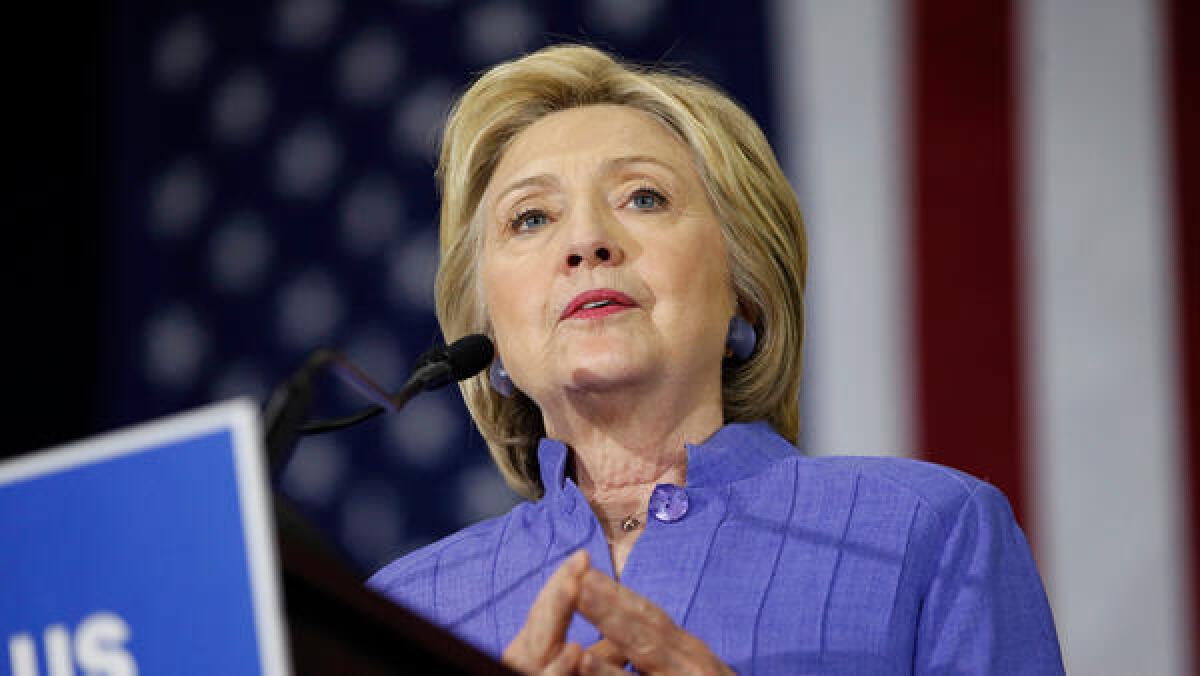
Hillary Clinton submitted to more than three hours of questioning at FBI headquarters Saturday morning about her “email arrangements” while she served as secretary of State, according to an aide.
The interview marks the first time that Clinton — now the presumptive Democratic presidential nominee — has responded in person to the law enforcement officials that are investigating her use of a personal email account and server for what were her official government communications.
“Secretary Clinton gave a voluntary interview this morning about her email arrangements while she was secretary,’’ said her spokesman, Nick Merrill, who added: “Out of respect for the investigative process, she will not comment further on her interview.’’
- Share via
Donald Trump’s use of Jewish imagery prompts backlash
Donald Trump was swiftly criticized Saturday for promoting an illustration that wove together a Jewish symbol and offensive stereotypes to attack Hillary Clinton as corrupt. The image featured a six-pointed star that resembled the Star of David with “most corrupt candidate ever!” written in it, all over a background of a pile of money.
Trump was immediately slammed:
After about an hour, Trump tweeted an altered version of the image, with a circle replacing the star. He later deleted the original tweet.
As one Twitter user noticed, the redo was hasty.
- Share via
Colorado Republican who got death threats from Trump supporters: ‘I don’t have any animosity’ toward him
Back in May, after Donald Trump effectively locked up the Republican presidential nomination, the Colorado GOP party chief called on Trump to put in some face time in the state to soothe frayed feelings from the contentious primary season.
“He needs to come here,” Steve House said then. “The sooner that happens, the better off we’re going to be.”
This weekend, Trump finally visited. He was the marquee speaker Friday at the Western Conservative Summit, an annual gathering in Denver, and House was on hand to introduce the presumptive GOP nominee in a symbolic gesture of party unity.
Afterward, House gave Trump’s Denver jaunt — which included a high-dollar fundraiser — high marks.
“It went very well. He was willing to engage me directly in a number of occasions today,” House said in an interview. “He highlighted how important the party was and how important Colorado was, and I think those were great moves forward for us in unifying around Mr. Trump.”
Trump gleefully shredded the GOP establishment firmaments during the primaries and was particularly relentless in his criticism of the Colorado GOP. He blasted the state’s arcane delegate-selection process, in which Trump failed to secure slots for his supporters, as “rigged.” House got death threats in the backlash.
House insisted he did not blame Trump for his supporters’ ferocity.
“I don’t have any animosity around him whatsoever, nor did I ever,” he said. “However, I think that a lot of Coloradans wanted to see that he and I could actually work together, and I think there was a lot of that that happened” on Friday.
Still, House winced a bit when discussing Trump’s Friday speech, in which the presumptive nominee continued to dwell on past primary grievances.
“I wish he hadn’t,” House said. “But at the same time, he must still be feeling the effects of it a little bit. If he is, he is. I didn’t expect it to come up. He wanted to say his piece. He said his piece and now we’re moving forward.”
- Share via
Debunking the ‘home-state advantage’ and other myths of picking a vice president
There’s a good rule of thumb, as previously noted, when it comes to the vice presidential selection process: Those who know don’t talk, and those who talk probably don’t know.
Still, the speculation abounds, spun like so much tempting but air-filled cotton candy: Chris Christie! Elizabeth Warren! Newt Gingrich!
Much of the talk is rooted in notions that have hardened into political truths: that a vice president can boost the top of the ticket by adding ethnic or geographic balance. Maybe they can even help their ticket carry their home state.
Political scientists Christopher Devine and Kyle Kopko have a new book, “The VP Advantage: How Running Mates Influence Home State Voting in Presidential Elections,” that explores and debunks some of those notions.
In an interview, Devine, who teaches at the University of Dayton in Ohio, and Kopko, an assistant dean at Elizabethtown College in Pennsylvania, also offered some advice to Hillary Clinton and Donald Trump, should they seek help in choosing their No. 2.
- Share via
How much has Donald Trump influenced Republicans? Look at the drop in support for free trade
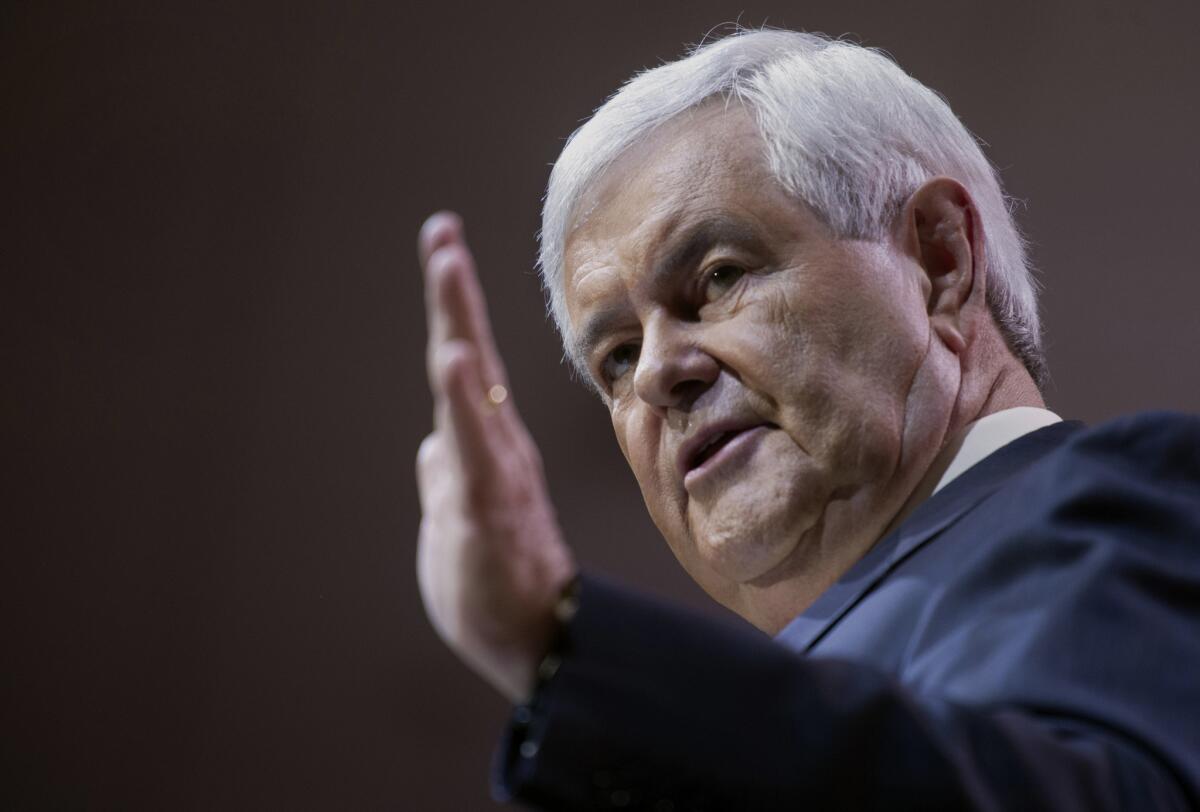
It was a seminal moment when Newt Gingrich, the former House speaker who was essential in building support for the North American Free Trade Agreement two decades ago, told Politico that he now agrees with Donald Trump’s brand of free-trade skepticism.
Gingrich is on the shortlist to become Trump’s running mate, making his ideological switcheroo a political necessity.
But what’s more startling has been the shift in their party. GOP support for free trade dropped 20 percentage points between 2009 and 2016 – from 59% of Republicans agreeing that U.S. trade agreements have been a good thing in a 2009 survey to 39% saying so this year, according to the Pew Research Center.
The biggest drop happened this year – down from 53% in 2015 – lending evidence to the theory that Trump has led on the issue.
Support for free trade among Democrats has moved in the opposite direction since 2009, but has not dropped below 51%. It’s now up to 59%.
Republicans used to be seen as the party of free trade while Democrats were viewed as the protectionists, largely because of their ties to organized labor who saw open borders as a threat to manufacturing jobs.
The parties flipped in 2011, according to Pew’s polling. That coincided with the growth of the tea party movement, the first rumblings of a blue-collar base, some of whom Trump has harnessed in a new direction this year.
But not everyone opposes trade for the same reasons. Many skeptics on the left, like Massachusetts Sen. Elizabeth Warren, say these deals allow opportunities to undermine consumer regulations on big banks and business.
Pew also has interesting data on that question. The center compared the different reasons cited by Americans and Germans who oppose the Transatlantic Trade and Investment Partnership, a proposed agreement between the U.S. and the European Union.
Half of American opponents cited the effect on wages and jobs, a relatively small concern among Germans (17%). The vast majority of German opponents, 61%, cited a loss of standards and regulations on food, cars, safety and the environment, a concern named by only 12% of American opponents.
- Share via
Republicans want to hold on to control of the Senate. Donald Trump keeps complicating that
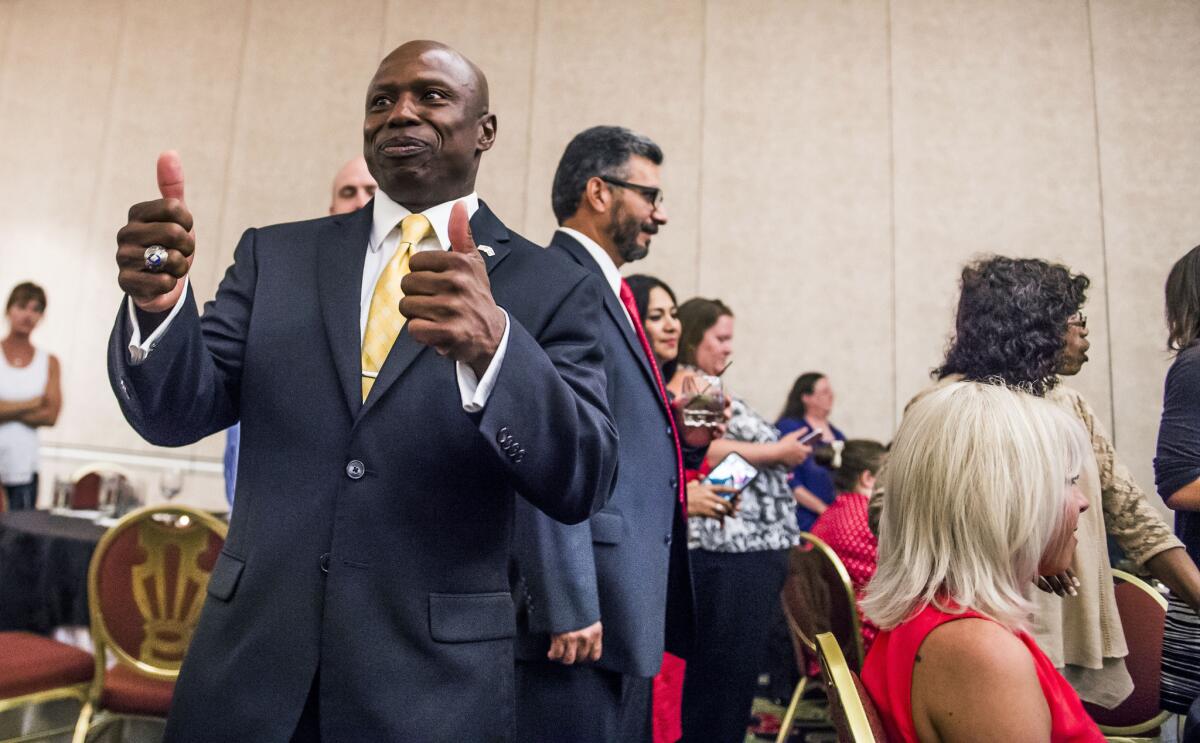
The battle for control of the Senate just hit a rough patch for Republicans in Colorado.
The story has become a familiar one: An anti-establishment candidate rode a conservative wave to emerge over party-preferred favorites as the GOP nominee for a Senate seat.
Newcomer Darryl Glenn, an Air Force veteran and collegiate bodybuilding record-holder, enjoyed a hefty primary assist from Sarah Palin, Ted Cruz and other renegade Republicans, including the Senate Conservatives Fund. He is also a supporter of Donald Trump.
Trump’s potential drain on down-ballot races has increasingly worried Republican leaders, who made little public comment about the outcome.
Colorado was once seen as the GOP’s best chance to play offense in their quest to keep the Senate majority. No more. The non-partisan Cook Political Report shifted its analysis of the race to favor Democrats, as Sen. Michael Bennet seeks a second term.
Republicans have two dozen GOP-held seats at stake as they try to keep the majority this fall, a particularly tough haul in swing states such as Illinois, Pennsylvania and Florida where Trump is unpopular.
Senate Majority Leader Mitch McConnell scored a victory in convincing Florida Sen. Marco Rubio to run for re-election rather than retire, as planned, after Rubio’s failed White House run.
Rubio faces his own Trump-aligned primary candidate, wealthy businessman Carlos Beruff, who is self-funding his campaign, though the incumbent is favored to win the primary.
Many big-name donors, including the influential Koch network, are spending their money on Senate and other down-ballot races in hopes of preserving the GOP majority in Congress, which is now no sure bet.
- Share via
Donald Trump promises to announce the Republican convention lineup next week
- Share via
How Tim Kaine went from ‘wild card’ vice presidential pick to shortlist favorite for Hillary Clinton
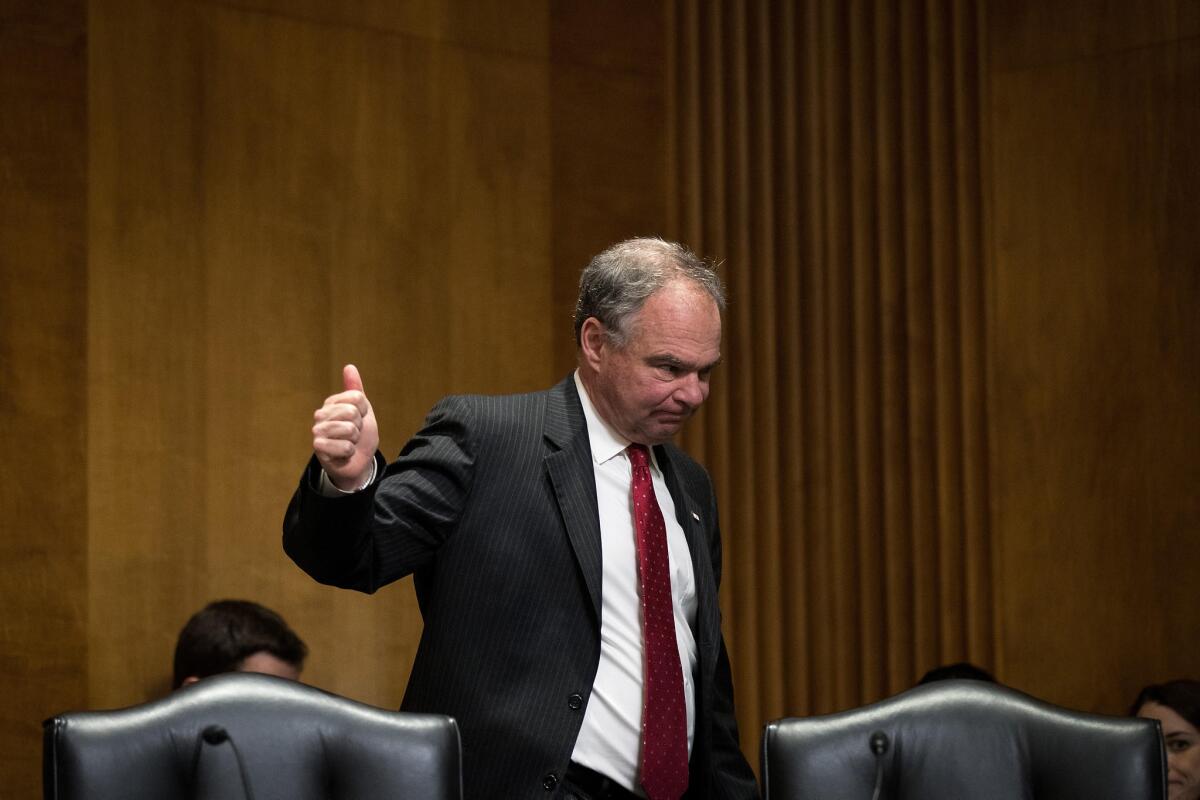
Reviewing the finalists to be his running mate in 2008, Barack Obama offered this assessment of then-Virginia Gov. Tim Kaine: “He’s the wild card.”
Now, as Hillary Clinton whittles down her potential vice presidential picks, Kaine has moved from what he once called the “long shot on a short list” to perhaps the safest, most obvious choice.
Whether the Virginia senator will end up on the Democratic ticket is a decision for Clinton and her advisors vetting candidates, said to include fellow Sens. Elizabeth Warren of Massachusetts and Sherrod Brown of Ohio, and Secretary of Housing and Urban Development Julian Castro. She will name her pick ahead of the Democratic National Convention late this month.
- Share via
Rival pro-Trump super PACs fight for GOP cash with little success
Donald Trump’s fundraising woes extend well beyond his campaign’s lackluster effort to raise money.
A hodgepodge of rival outside super PACs is now fighting — without much success — to attract rich GOP donors and the candidate’s implicit endorsement.
As the pro-Hillary Clinton super PAC Priorities USA Action deploys some of its $88 million in contributions to flood the airwaves with anti-Trump TV ads, wealthy contributors wishing to invest in the pro-Trump effort are facing an odd assortment of super PACs with competing visions, questionable capacity and sometimes sketchy track records.